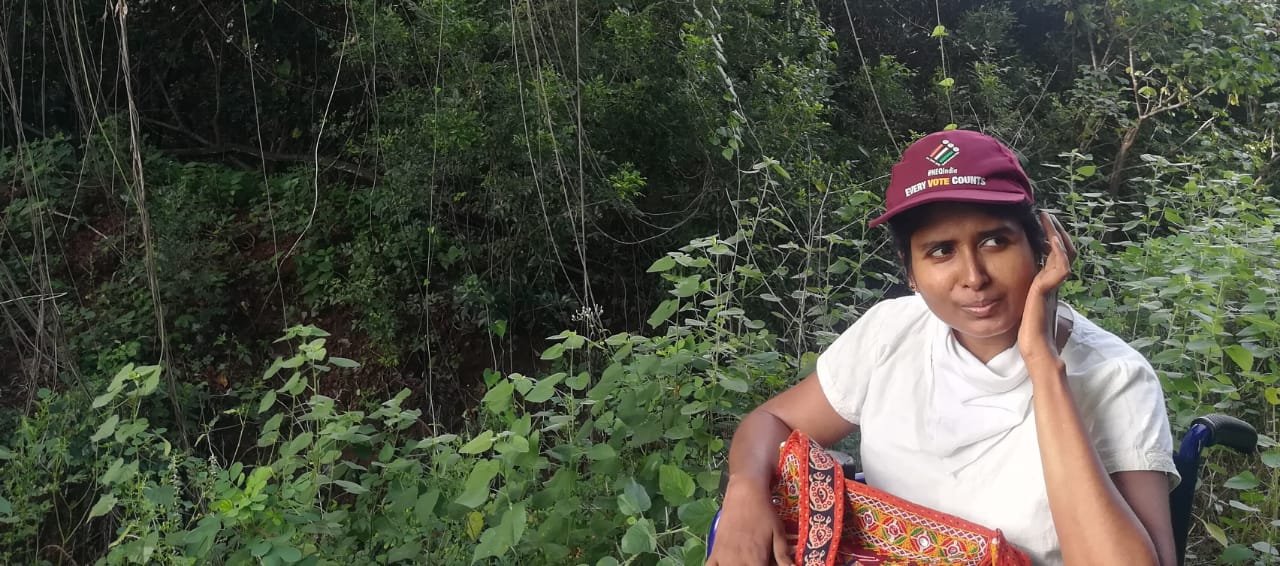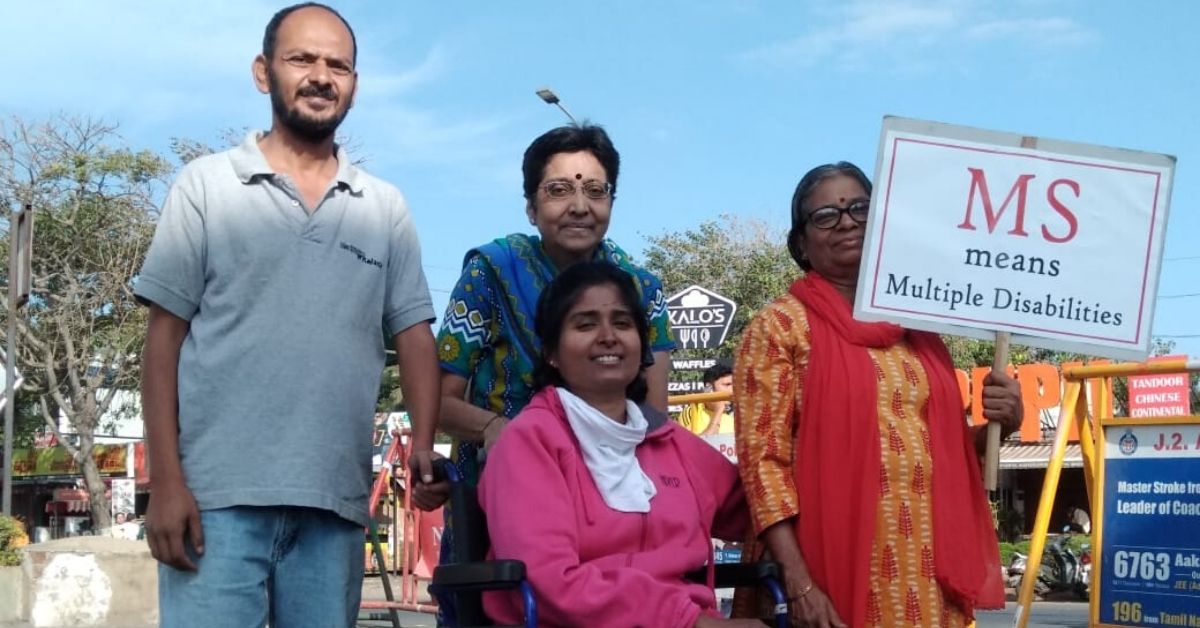Smitha Sadasivan was 19 when she was diagnosed with multiple sclerosis (MS). She recalls, “I had been feeling tired and sleepy all the time, unable to concentrate at college. And people wondered if I was just being lazy.”
After a long and troubled period of non-diagnosis which led to severe mobility, bladder failure and repeated hospital visits, lesions in her brain revealed from MRI scans helped identify her condition.
Today, health setbacks do hit her occasionally, from severe relapses to chronic intense fatigue, but she has accepted her condition fully and learnt to live a full life despite it all.
Twenty years later, at 39, not only has she emerged as a successful, globe-trotting go-getter, she is also ensuring that MS or any other disabilities don’t pose barriers to people with disabilities.

Smitha’s journey as an activist started when she was merely 23, with her entry into the Vidya Sagar’s Disability Legislation Unit. Here, she became aware of the constitutional rights of people with disabilities. Some of the on-ground changes she brought, even as a greenhorn, include getting UGC to bring out braille question papers for the first time (for a UGC NET candidate with deaf-blindness) by facilitating a PIL (Miranda Tomkinson Vs UGC) for it in Madras High Court in 2013.
In this case, the Madras High Court had issued an interim order to the UGC to come with a Braille question paper exclusively for the deaf-blind candidate, stating that this facility should be extended to other disabled persons needing it. The final order in this matter is awaited.
She also facilitated a Parliamentary training programme for women with disabilities to understand the legislative structure.
However, it was after attending the South Asia Disability Dialogue on Political Participation in 2015 that she embarked on a new mission–to make the Indian electoral process accessible for persons with disabilities and others with reduced mobility.
“I am passionate about rights. For people with disabilities, accessibility is an underlying yet crucial right. If accessibility and reasonable accommodation are missing, people with disabilities cannot exercise their rights, which leads to discrimination,” she says.
More than the general, it is specific issues that spur her. She shares, “Upholding an individual’s rights creates a big change in their life, without which they are stuck and helpless. When we work for an individual, it is easier, as you don’t need a policy change. But if you enable the breaking of unfair barriers for one person, it can be cited and could become a policy eventually.”
Being on the seashore, gazing at the horizon and losing oneself in contemplation and awe at the beauty and majesty of nature is one of the simple pleasures of life. But for those of us with disabilities, this simple joy is an impossible dream, as there is no pathway for wheelchairs leading up to the seashore, even at the iconic ones like Chennai’s Marina, the world’s second-longest beach.
Chennai-based Smitha, a wheelchair user, would not have this scenario continue, and this is how she set upon it.
In December 2016, she invited K S Kandasamy to Vidya Sagar, a disability services and support organisation. He was the Deputy Commissioner of the Greater Chennai Corporation (GCC) and would observe how difficult it was for children and adults with disabilities to go to the beach in the absence of an accessible pathway.
Along with a team from Disability Rights Alliance (DRA), Smitha got an architect to design a walkway, which was shared with the officials. It was then sent to the environment department for clearance.
Next, Smitha initiated a series of talks between the DRA and the environment officials about why the location they had suggested–a remote site in South Chennai–wouldn’t serve the purpose of inclusion of people with disabilities into mainstream life.
Eventually, their team managed to drive home the message, and a fresh GCC proposal for this accessible walkway on the Marina beach, is now underway.
Likewise, in 2015, she took Rajesh Lakhani, then Chief Electoral Officer, Tamil Nadu, to the Institute of Mathematical Sciences, and arranged for him to learn first-hand the needs of people with disabilities. This further led to people with psychosocial and intellectual disabilities getting included (for the first time ever in the country) in the electoral roll for the 2016 Tamil Nadu state legislative elections.
“We also got the CEO’s office to conduct a special voter awareness camp at Vidya Sagar, where adults with intellectual disabilities got to understand the voting process,” informs Smitha.
This has been Smitha’s style of doing things–drawing stakeholders into a real and deeper understanding of the issue. “It’s a collaborative effort. We give our expertise; they handle the administration.”
Well, hers has been quite a successful strategy. She is now the Accessibility Consultant to the Election Commission of India, apart from being an active member of Disability Rights Alliance India.
Recently, she was awarded the NCPEDP – Mphasis Javed Abidi Public Policy Award for Universal Design, in recognition for her efforts in promoting accessibility for people with disabilities.
Smitha raises her voice against injustice even when she is a bystander. A recent case in point is when Advocate Muruganandam had filed a case in the Madras High Court seeking access to justice (pertaining to judiciary system) in 2018. Smitha had accompanied Muruganandam as an observer during the proceedings and encountered inaccessible toilets in the high court campus. Another wheelchair user who had also gone to the court then, had had to urinate into a bottle to relieve himself. Smitha took this to the media. In two days, the court created an accessible toilet.
“Now, this accessible toilet benefits all people with disabilities visiting the high court. Remember, it began with achieving an individual’s right,” she points out.
She adds, “It is more emotional for me. I see the person’s suffering and feel compelled to do something to resolve the situation, which eventually helps everyone.”
Advocate Muruganantham shares, “I get angry and frustrated that persons with disabilities are not provided their rights and that laws are enacted without considering their needs. Smitha mentored many incumbent disability rights activists like me, inspiring us to work constructively to achieve real changes.”
As a person with multiple sclerosis, she is a member of the Multiple Sclerosis Society of India (MSSI). She also encourages support circles and trust deeds for adults with disabilities, along with supported decision-making and accessible housing for people with intellectual disabilities.
In addition, she is associated with different forums, initiatives and organisations including Vidya Sagar, National Committee for the Rights of Persons with Disabilities, Association for the Deaf, Organisation for Rare Diseases India, Rising Flame, South Asia Regional Program on Women’s Institute on Leadership and Disability.
Also Read: Awarded Padma Shri, This Pioneering Heart Surgeon Has Performed 40,000+ Surgeries
“My current goal is to make the country’s electoral process accessible and inclusive for all persons with disabilities. My long term goal is to enable political education and empowerment of Persons with Disabilities and to enable them to participate in the decision-making process of the country,” she concludes.
(Edited by Shruti Singhal)
Like this story? Or have something to share?
Write to us: contact@thebetterindia.com
Connect with us on Facebook and Twitter.
We bring stories straight from the heart of India, to inspire millions and create a wave of impact. Our positive movement is growing bigger everyday, and we would love for you to join it.
Please contribute whatever you can, every little penny helps our team in bringing you more stories that support dreams and spread hope.

